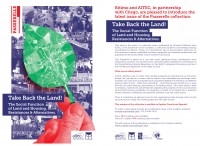Every four years, Brazilians decorate their streets in green and yellow, celebrating the arrival of the most anticipated sports tournament in the country. With the kick-off for the FIFA World Cup in Brazil less than one month away, the country’s passion for football should be pulsating more than ever. But there are some signs to the contrary. “World Cup for whom?” read the words painted on a wall on a street in Sao Paulo.
Latest news
- France begins eviction of 650 migrants from Calais camps
- Anti-eviction group creates crowdsourcing map for stories of displacement
- More foreclosures, more middle-aged suicides, study finds
- When it comes to hosting the Olympics, more cities are saying, ‘Hold that thought.’
- European leaders urged to end plight of 600,000 stateless people
Latest from the collection
- Raquel Rolnik’s mandate ends. Leilani Farha is the new rapporteur. – Newsletter #47
- Roots and Branches
- New Materials on Security of Tenure in Several Languages – Newsletter #46
- Guide: Guiding principles on security of tenure for the urban poor
- Address acute housing crisis – Special rapporteur on adequate housing
Learn more

